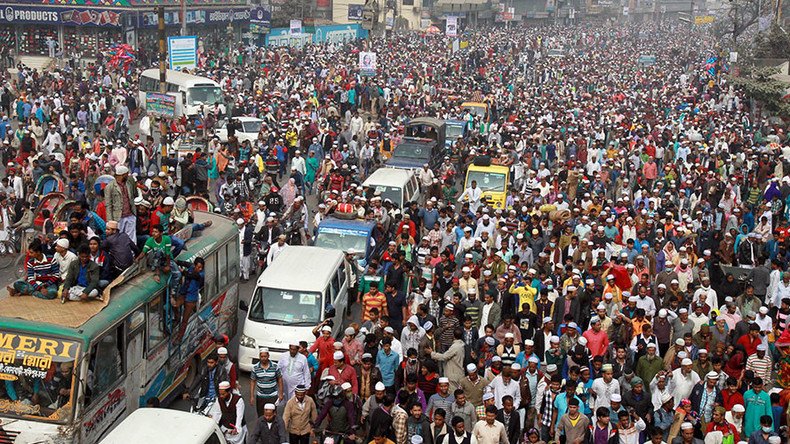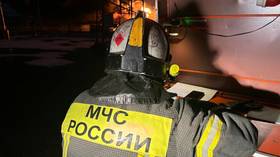'Megathrust': Giant Bangladesh earthquake could put 140mn lives at risk, study says

Up to 140 million lives could be at risk from a potentially massive earthquake in Bangladesh, according to a new study. The research found that pressure is building along a fault line situated underneath the most densely-populated nation on Earth.
The research, published in the journal Nature Geoscience on Monday, found that a juncture between major tectonic plates in the region is locked and mounting with stress.
Citing data collected using GPS devices since 2003, the paper states that measurements found convergence of tectonic plates at a rate of 13-17mm “on an active, shallowly dipping and locked megathrust fault.”
One plate is moving under the other deep beneath the surface, and two plates are stuck together at the upper layers of the fault. The plates are covered in layers of sediment more than 20 meters thick.
The situation could result in a magnitude 8.2 to 9.0 earthquake in Bangladesh.
“Some of us have long suspected this hazard, but we didn’t have the data and a model,” study co-author Michael Steckler, a geophysicist at the Lamont-Doherty Earth Observatory at Columbia University in New York, said in an article on the university's website. “Now we have the data and a model, and we can estimate the size.”
Steckler and his colleagues have estimated that the 140 million people living within 100km of the fault would be at risk if the quake struck the area. He stressed, however, that it is impossible to predict when such an earthquake might occur.
"We don't know if it's tomorrow or if it's not going to be for another 500 years," he said. "We don't know how long it will take to build up steam, because we don't know how long it was since the last one. But we can definitely see it building.”
Steckler went on to state that those most at risk are the 17 million people living around the low-lying Dhaka region of Bangladesh, which struggles with poor construction and is therefore most at risk of building collapses in the event of an earthquake.
Overcrowding in Dhaka could also hinder rescue efforts in such an event, according to Steckler.
"Right now, the streets are clogged with traffic such that it's impossible to drive around Dhaka on a normal day," he told Live Science. "If you fill the streets with debris, it's really going to be impossible to get supplies and rescue equipment and things like that around.”
Those thoughts were echoed by co-author Syed Humayun Akhter, a geologist at Dhaka University.
“...In Dhaka, the catastrophic picture will be beyond our imagination, and could even lead to abandonment of the city," he said.
The research team is now building a more advanced map of the shape of the fault, and looking at historical tsunami data to understand how often megathrust earthquakes occur, Steckler said.
The zone is an extension of the fault line which caused the 2004 Indian Ocean earthquake and tsunami that killed 230,000 people in 14 countries.













